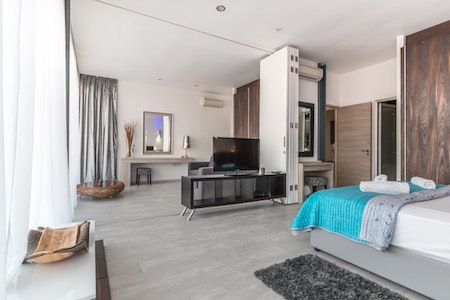
Custom Text added by the Ada Compliance plugin (disable plugin to remove)
Whether you conduct property inspections yourself or hire a professional, it’s important to habitually assess and track the condition of your rental property. Reports from the inspections can also serve as important legal documents should you require them in a legal dispute.
Generally, inspections will provide two major benefits to Orlando rental property owners. One, you can rest assured that your tenants are abiding by lease terms and are taking good care of your property. And two, you’ll be able to identify any maintenance issues early on before they become serious and costly.
Ground Rules for Rental Inspections in Orlando, FL
Before entering a rental property, it’s important to understand the existing limitations. Generally, all renters have the right to quiet enjoyment of their homes, regardless of whether it’s expressly stated in the lease or rental agreement or not.
Under Orlando rental law, you are required to notify tenants prior to your visit. Specifically, except in cases of emergency, you must give tenants at least a 12 hours’ notice of your intent to enter the rental unit.
The inspection time must be reasonable. Florida’s landlord-tenant laws define “reasonable time” as between 7:30 a.m. and 8:00 p.m. It also goes without saying that the reason for the entry must be within the confines of the landlord-tenant law.

Under the law (Fla. Stat. Ann. § 83.53), Orlando landlords can enter rented premises for any of the following situations:
- To show the property to prospective tenants, buyers or contractors.
- During a renter’s extended absence.
- If you have reasonable cause to believe that the renter has abandoned the rental premises. For example, if the utilities are shut off or if witnesses claim to see the renter moving furniture.
- Pursuant to a court order.
- To make needed inspections and repairs.
- In case of emergencies, such as water leakages or fire.
- If the tenant is home and agrees to allow you to come inside.
- If you have a good reason and give notice. You must state the reason for the visit in the notice.
Needless to say, the number of visits must be reasonable. Too many frequent visits may lead to problems. A tenant may claim that you are harassing them. To avoid legal problems while keeping up with a rental property, it’s advisable that Orlando landlords do the following:
- Keep a record of each visit. The record should include the reason for the visit, a copy of the notice and any other appropriate details.
- Only visit the property for a valid reason. For instance, enforcing the terms of the lease.
- Always give your tenant the required notice. In Orlando, you are required to give your renters 12 hours’ notice prior to entering the rental unit.
Here are additional tips for rental property inspections:
- Make sure that prospective tenants are aware of the inspections at the lease signing. This will help reduce conflicts. It’ll also show prospective tenants that you care about your property.
- Encourage the renter to be available during the inspection.
- Always provide prior notice.
- Regardless of the behavior of the renter, never threaten or harass them.
- Foster cooperation with the tenant. Encourage them to talk to you about the property’s condition.
So how often should you inspect your Orlando rental property?
Generally, you should inspect your Orlando rental property four times. When the tenant is moving in or moving out, seasonally, or when driving by.
Move-in Inspection
You and your new renter should inspect the property at the start of the tenancy. This helps document the condition of the property in order to have something to reference to. Ideally, both of you should have a checklist. In the review, include such things as light fixtures, faucets, appliances, doors, windows, floors and walls. Are they working as they should?
Record and photograph things like thumbtack holes, dents, and scuffs. After documenting everything, have the tenant sign the document. The move-in inspection checklist will help you determine if the tenant is liable for any damages when they are moving out.

Move-Out Inspection
A move-out inspection is similar to a move-in inspection. It helps you determine if the renter has left the property in the same condition as they found it when they were moving in. Your move-in inspection paperwork should act as a reference to your move-out inspection checklist.
Compare the two checklists and note the difference. Has the tenant caused any damage in excess of normal wear and tear? If yes, you have a right under your Orlando lease or rental agreement to deduct the costs of the repairs from the tenant’s security deposit.
Examples of property damage Examples of normal wear and tear Carpet soaked with pet urine Loose door handles Damaged or missing door handles or locks Dirty grout A hole in the middle of the door Color of hardwood or carpet fading due to exposure to sunlight Broken toilet seat A couple of scrapes or dings in a wood floor A smashed bathroom mirror A couple of small stains on a carpet Unauthorized painting Wobbly toilet Holes or tears in linoleum Scuff marks or worn patches on linoleumTo avoid tenant disputes over any deductions, conduct a move-out inspection together with your tenant.
Seasonal Inspection
Seasonal inspections go hand in hand with seasonal maintenance. Examples of seasonal maintenance include weathering water pipes in the winter or cleaning gutters every fall. Seasonal inspections also provide an opportunity for you to assess the property for needed repairs.
Drive-by Inspection
Unlike other inspections, you don’t need to give your tenant a prior notice of your visit. Since renters will be unaware of your visit, a drive-by inspection can reveal lease violations such as long-term guests or unauthorized pets.
That being said, you should make sure the visits are reasonable. If they are too often, your tenant may claim that you are infringing on their privacy rights.
Inspections are without any doubt important landlords’ tasks. They help make sure that the renter is taking good care of your home, that issues are addressed before they become serious, and that your Orlando rental property remains a moneymaking juggernaut for years to come.

Finally, don’t forget to praise tenants who’re doing a great job caring for the property! If you need help managing your Orlando rental property don’t hesitate to contact us.